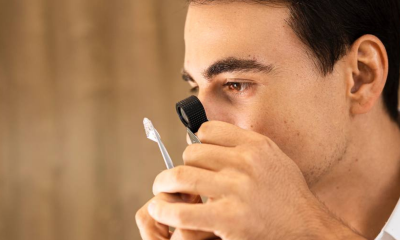BUSINESS NEWS
Coronavirus sinks jobs for hospitality grads, but experts see opportunity
Dan Dalton | Getty ImagesAnother 1.48 million Americans filed for unemployment last week due to the coronavirus pandemic, bringing the total for those receiving benefits to just below 20 million. Few industries have been as hard hit as the hospitality sector, which experienced mass layoffs and furloughs across the globe. According to the latest forecast revision from STR and Tourism Economics, even though performance is already improving, U.S. hotel demand will not return completely to prepandemic levels until 2023.Facing a bleak job market, recent graduates are now looking for ways to use their skills in other industries, while educators are using the pandemic as an opportunity to give a real-life lesson to current students in crisis management.It wasn’t so long ago that hospitality was one of the most promising fields to pursue. A degree in hospitality management could set you up for a successful career at an airline, large hotel or restaurant chain, an exhibition or conference center, a major event venue and more. According to the U.S. Bureau of Labor Statistics, in June 2019 the leisure and hospitality industry — which consists of accommodation and food services and arts, entertainment and recreation — hired 1,142,000 people nationwide, an increase of 42,000 hires from May and 64,000 hires from June 2018. But this all came to a screeching halt as 95% of Americans were placed under some kind of stay-at-home order in mid-March, shuttering restaurants, bars, hotels and casinos and forcing all events to cancel.”It’s amazing how quickly circumstances have changed. Three months ago I was telling the senior class it’s never been a better time to be a graduating senior. I was working with them on how to manage multiple offers,” said Meg Radunich, director of career services at Boston University’s School of Hospitality Administration. Hospitality students expecting to start internships this summer were suddenly empty-handed, while graduates with job offers saw start dates pushed to September from May and June or rescinded altogether.”It’s a tough situation. What makes it tougher is that the students will be competing for jobs with employees who have been furloughed,” Radunich said. “I’ve never seen anything like this,” said Chip Rogers, president and chief executive of the American Hotel and Lodging Association, an advocacy group for the industry. Real-life crisis training Hospitality programs and recent grads are using the current crisis to play up applicable skills. Kate Walsh, dean at Cornell’s School of Hotel Administration, said she sees the pandemic’s impact on the industry as an opportunity to think about innovation and new technology offerings that could be in place. The school is “training emotionally intelligent leaders who also have background in how to use data strategically. … It hasn’t been a situation where we said ‘go into manufacturing,'” she said. Cornell has tapped its network of graduates, particularly those from the class of 2009, to offer advice to current seniors and share stories about how they pursued different opportunities or found their way back into the industry after stepping away. “That’s been very profound and helpful for students. They have really great stories around resilience and taking the long view. This pandemic is more devastating than 2008 and even 2001, but there are definitely learning points to take from them,” said Walsh. Professors are also using the current pandemic as an opportunity for learning. Walsh said some faculty have reached out to say there should be some increased focus on tech and sanitation. At Boston University, some faculty have changed the final projects in the spring semester to address current challenges. One marketing class looked at how restaurants can continue to generate revenue without table service and how to create marketing campaigns around that. Diners eat lunch in outdoor seating at a restaurant in the Little Italy section of Manhattan on the first day of the phase two re-opening of businesses following the outbreak of the coronavirus disease (COVID-19), in New York, June 22, 2020.Mike Segar | Reuters”Professors have embraced what is going on and brought it into classrooms. These are problems to solve in the post Covid-19 climate,” said Radunich. Allison Steiner, who recently graduated from Boston University with a degree in hospitality management, saw her job prospects dry up in the spring. Steiner had hoped to move to New York City and find work with an event planning company. When the pandemic hit, she continued applying to jobs but eventually realized that she needed to try something else. “I didn’t stop my job search immediately. I was trying to keep my hopes up,” she said. With her background in events planning, she now intends to start a business that arranges online parties for children.”I have an opportunity to create something that won’t be taken away with the virus. I’d be using my skills to create joy for other people during this time. That’s what events are all about,” she said. She’s also started studying for a New York real estate license and plans on working with her aunt in the industry once she has the license. Students from hospitality school can write a business plan, she notes. “I think that real estate is a great way to pivot. … It’s marketing, customer service, serving community — all the things that we learn. Our skills can translate,” she said. More education Besides finding or creating new opportunities, recent grads are also looking at further education, hoping they’ll have additional qualifications by the time the current crisis abides. After seeing his job hopes dashed, recent Boston University graduate Alex Kugelmass applied to graduate programs. His plan had been to apply for a manager of operations role at a hotel in April but that changed abruptly. “The hospitality market was amazing. … There were always good projects and jobs in the operations field. That all changed in late March. I would say close to 70% of the hotels in Boston had closed. The ones opened barely had anyone in them. A lot of companies like Marriott had hiring freezes,” he said. He had been working as a housekeeping supervisor at the Liberty Hotel in Boston when the pandemic hit and the hotel had to lay off almost everyone. Like many other recent graduates, he started considering a graduate degree. Many schools extended their application deadlines and dropped GRE or GMAT requirements. Kugelmass applied to several masters in management studies programs that will start in the fall. In addition to advocating for more aid to the hospitality industry, the AHLA has also opened up its educational and certification offerings for free. “With more than half out of work right now, many want to increase their knowledge and skill set and get certifications,” said Rogers, adding that the association is also working to connect members with opportunities. The Hospitality for Hope program created a database of 17,000 hotels that volunteered to be used for hospital overflow or to provide quarantine housing for first responders or healthcare personnel. Now they are looking to connect those on the list to universities and colleges who may use hotels as hotel rooms, to avoid crowding in dorms. Still, even with these measures, Rogers said it’ll be “a long road back. … If I put it in financial magnitude, this is 50 times worse than the financial crisis when there was a temporary slowdown in business travel. This time you’ve got not just a slowdown but zero business, meeting and leisure travel.”While leisure travel has started to pick up with states reopening, the industry needs occupancy rates of at least 55% to break even, he said. According to STR, recent occupancy rates in mid-May were at 32.4%. Against the dismal backdrop, some still see opportunity.”The interesting story might be that there’s no opportunity, but we really don’t feel that way. We watch the RevPar and occupancies and legislation every single day, and we know this will take some time for the industry to recover. But we’ve got some amazing leaders that will be prepared to do that,” said Walsh. For more on tech, transformation and the future of work, join the most influential voices disrupting the next decade of work at the next CNBC @Work Summit this October.
Source link













